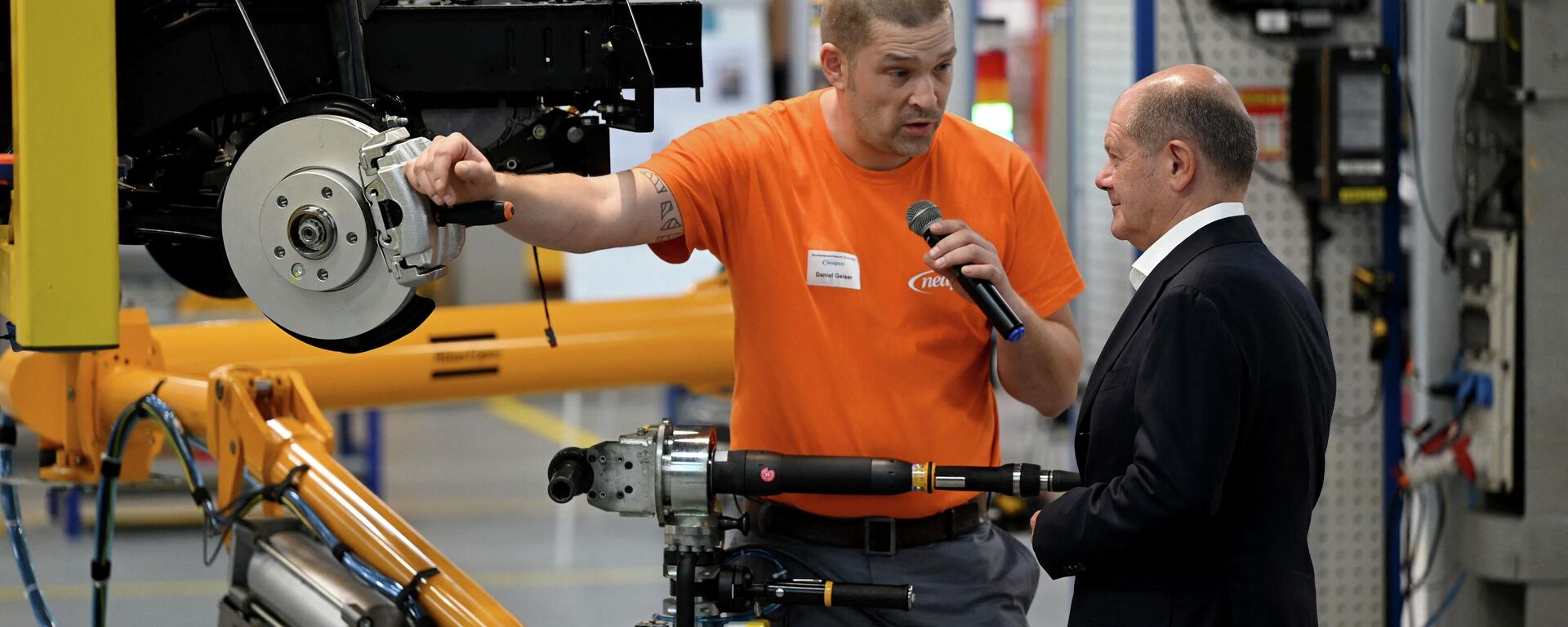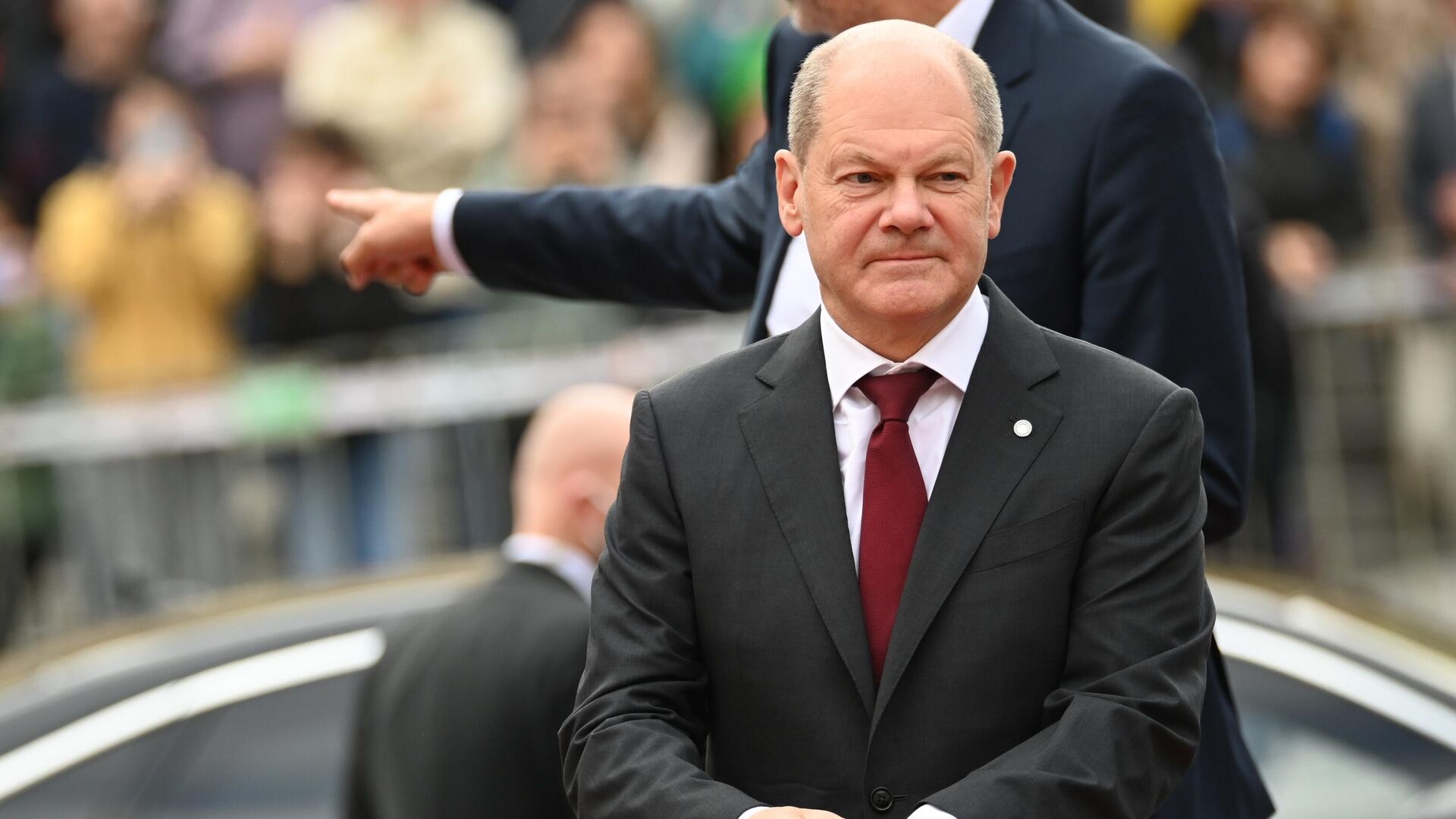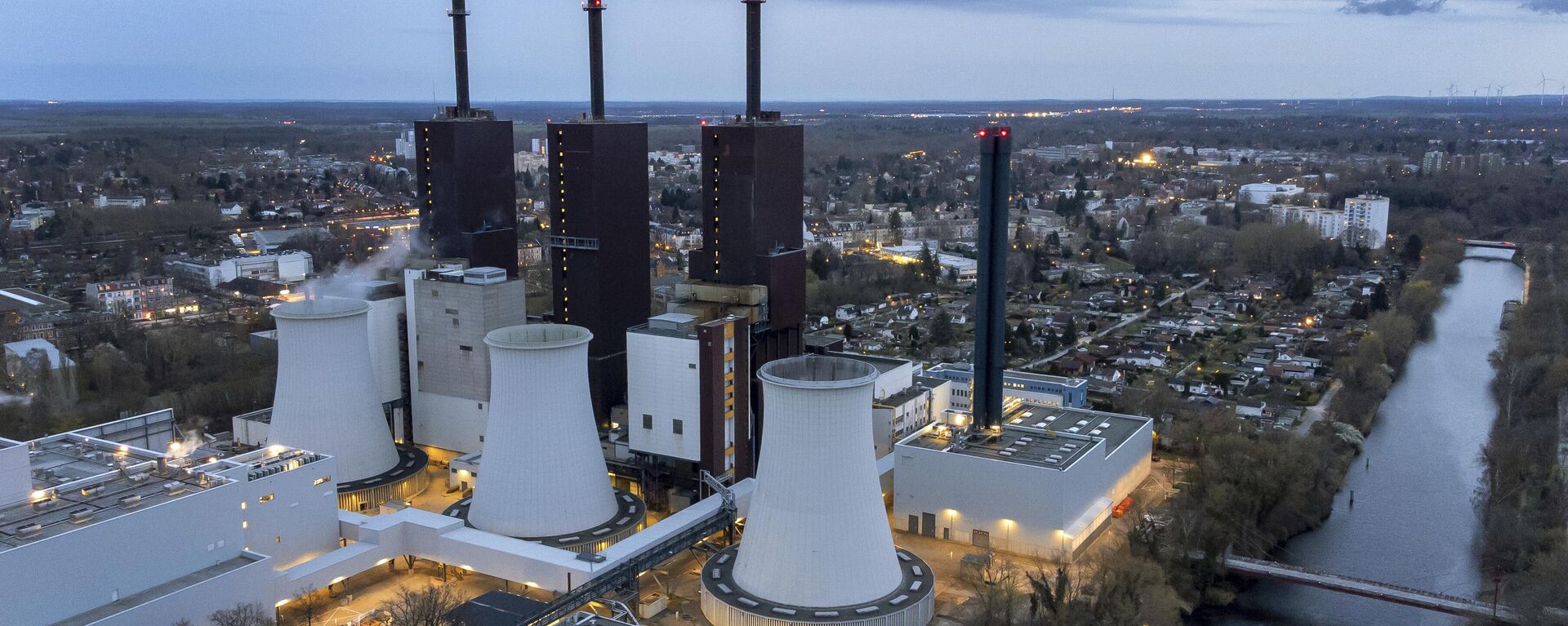https://sputnikglobe.com/20240124/no-relief-for-europes-two-major-economies-as-early-2024-shows-a-bleak-start-1116359892.html
No Relief for Europe's Two Major Economies as Early 2024 Shows a Bleak Start
No Relief for Europe's Two Major Economies as Early 2024 Shows a Bleak Start
Sputnik International
The 20-member Eurozone most likely entered a recession in the last quarter of 2023. Though data shows that Germany narrowly escaped downturn territory, its economic future and that of France are still stuck in a rut.
2024-01-24T16:55+0000
2024-01-24T16:55+0000
2024-01-24T16:55+0000
pmi
european union (eu)
sputnik
houthis
berlin
france
germany
alexander rossi
olaf scholz
emmanuel macron
https://cdn1.img.sputnikglobe.com/img/07e7/0b/0c/1114907920_0:0:3065:1725_1920x0_80_0_0_313defac683fecc05f5fd86f4157462d.jpg
Euro area private sector activity showed a weak start this year, shrinking for the eight months to January, Bloomberg reported.Data released on Wednesday showed S&P Global's purchasing managers' index (PMI) fell short of economists' projections of 48 but managed to hit 47.9, its closest to the 50-level mark recorded last July. The manufacturing sector contributed to this improvement, leaping to a 10-month high, while the services industry slumped, the agency said.The figures came out less than a week ahead of the publication of fourth-quarter output figures. This indicates the likelihood that the Eurozone's 20-member-state economy was likely in recession. However, some modifications to the initial data implied Germany narrowly escaped the slump zone.Economists predict Europe's biggest economy will not escape an economic downturn early this year as its January PMI figures are dismal. France is also facing a bleak start.Last November, Germany's economy recorded the lowest growth among all the euro-area economies since the COVID-19 pandemic, according to the German Council of Economic Experts. It blamed the slump on soaring energy prices, which have hit heavy industry hard. France also faces economic headwinds thanks to falling output, weak purchasing activity and rising borrowing costs.Berlin and Paris's rash decision to join US-led sanctions against Russia following Moscow's special military operation in Ukraine in 2022 has severely backfired on their economies. Germany cut off access to cheap Russian energy supplies which had been the lifeblood of its industrial growth.A similar assessment was offered by Sergio Rossi, Professor of Macroeconomics and Monetary Economics at the University of Fribourg. He told Sputnik that the recession set in for a "number of reasons," especially those that "affect households' purchasing power negatively." He added that companies in Germany have significantly cut back investments in the country's economy due to abysmal consumer purchasing power and high-interest rates.The crisis in the Red Sea has added another layer of economic crunch on Europe's largest economy. However, Germany and France are not part of the US-led 'coalition' bombing Yemen in the key maritime route. Nevertheless, ships are compelled to circumnavigate Africa, hitting global supply chains with lengthy delivery times and increased shipping costs.“International trade will be affected negatively because Germany is an important component of the global supply chain: its economic problems will therefore rapidly induce similar problems across the whole EU and even beyond it," Rossi noted.Berlin and Paris still bear the brunt of an uptick in cost pressures, especially in the services sector where rising labor costs have a significant effect. The economic crisis sweeping across the two major European economies has prompted widespread dissatisfaction with Chancellor Olaf Scholz's ruling coalition in Germany and President Emmanuel Macron's government in France.The escalating farmer protests in Europe pile bigger problems on Germany and France. They could spark wider political instability in both countries as citizens demand governments focus on domestic issues in an echo of the US, where Republicans have demanded that the Biden administration address the migrant crisis on the US-Mexico border.
https://sputnikglobe.com/20231227/us-europe-likely-on-track-to-become-failed-economies-1115839426.html
https://sputnikglobe.com/20240117/german-economy-less-competitive-due-to-refusal-of-russian-gas-1116227429.html
https://sputnikglobe.com/20230825/german-business-confidence-plummets-as-recession-deindustrialization-pummel-economy-1112881899.html
berlin
france
germany
Sputnik International
feedback@sputniknews.com
+74956456601
MIA „Rosiya Segodnya“
2024
Chimauchem Nwosu
https://cdn1.img.sputnikglobe.com/img/07e7/09/01/1113046371_0:99:1536:1635_100x100_80_0_0_9c5c627283eca931c39fe4852bbb301c.jpg
Chimauchem Nwosu
https://cdn1.img.sputnikglobe.com/img/07e7/09/01/1113046371_0:99:1536:1635_100x100_80_0_0_9c5c627283eca931c39fe4852bbb301c.jpg
News
en_EN
Sputnik International
feedback@sputniknews.com
+74956456601
MIA „Rosiya Segodnya“
Sputnik International
feedback@sputniknews.com
+74956456601
MIA „Rosiya Segodnya“
Chimauchem Nwosu
https://cdn1.img.sputnikglobe.com/img/07e7/09/01/1113046371_0:99:1536:1635_100x100_80_0_0_9c5c627283eca931c39fe4852bbb301c.jpg
s&p global's purchasing managers' index, eurozone, euro area, post-covid-19 pandemic, german council of economic experts, special military operation in ukraine, europe's largest economy, chancellor olaf scholz, president emmanuel macron, us-mexico border crisis, us-led coalition attacking the houthis.
s&p global's purchasing managers' index, eurozone, euro area, post-covid-19 pandemic, german council of economic experts, special military operation in ukraine, europe's largest economy, chancellor olaf scholz, president emmanuel macron, us-mexico border crisis, us-led coalition attacking the houthis.
No Relief for Europe's Two Major Economies as Early 2024 Shows a Bleak Start
The 20-member Eurozone most likely entered a recession in the last quarter of 2023. Though data shows that Germany narrowly escaped downturn territory, its economic future and that of France are still stuck in a rut.
Euro area private sector activity showed a weak start this year, shrinking for the eight months to January, Bloomberg reported.
Data released on Wednesday showed S&P Global's
purchasing managers' index (PMI) fell short of economists' projections of 48 but managed to hit 47.9, its closest to the 50-level mark recorded last July.
The manufacturing sector contributed to this improvement, leaping to a 10-month high, while the services industry slumped, the agency said.
The figures came out less than a week ahead of the publication of fourth-quarter output figures. This indicates the likelihood that
the Eurozone's 20-member-state economy was likely in recession. However, some modifications to the initial data implied Germany narrowly escaped the slump zone.

27 December 2023, 20:06 GMT
Economists predict Europe's biggest economy will not escape an economic downturn early this year as its January PMI figures are dismal. France is also facing a bleak start.
“When assessing the performance of Germany and France, it is only a question of who is having the tougher time,” said Cyrus de la Rubia, chief economist at Hamburg Commercial Bank.
Last November, Germany's economy recorded the lowest growth among all the euro-area economies since the COVID-19 pandemic, according to the German Council of Economic Experts. It blamed the slump on soaring energy prices, which have hit heavy industry hard. France also faces economic headwinds thanks to falling output, weak purchasing activity and rising borrowing costs.
Berlin and Paris's rash decision to join
US-led sanctions against Russia following Moscow's special military operation in Ukraine in 2022 has severely backfired on their economies. Germany cut off access to cheap Russian energy supplies which had been the lifeblood of its industrial growth.
"This [Russian gas imports] has given us a competitive advantage in the past, it has been very profitable. After there was no more gas, we lost our competitive advantage because, naturally, energy prices in Germany became higher," German Economic Affairs Minister Robert Habeck told lawmakers last week.
A similar assessment was offered by Sergio Rossi, Professor of Macroeconomics and Monetary Economics at the University of Fribourg. He
told Sputnik that the recession set in for a
"number of reasons," especially those that
"affect households' purchasing power negatively." He added that companies in Germany have significantly cut back investments in the country's economy due to abysmal consumer purchasing power and
high-interest rates.
The
crisis in the Red Sea has added another layer of economic crunch on Europe's largest economy. However, Germany and France are not part of the US-led 'coalition' bombing Yemen in the key maritime route. Nevertheless, ships are compelled to circumnavigate Africa, hitting global supply chains with lengthy delivery times and increased shipping costs.
“International trade will be affected negatively because Germany is an important component of the global supply chain: its economic problems will therefore rapidly induce similar problems across the whole EU and even beyond it," Rossi noted.
Berlin and Paris still bear the brunt of an uptick in cost pressures, especially in the services sector where rising labor costs have a significant effect. The economic crisis sweeping across the two major European economies has prompted widespread dissatisfaction with Chancellor Olaf Scholz's ruling coalition in Germany and President Emmanuel Macron's government in France.
The
escalating farmer protests in Europe pile bigger problems on Germany and France. They could spark wider political instability in both countries as citizens demand governments focus on domestic issues in an echo of the US, where Republicans have demanded that the Biden administration address the migrant crisis on the US-Mexico border.

25 August 2023, 12:02 GMT








